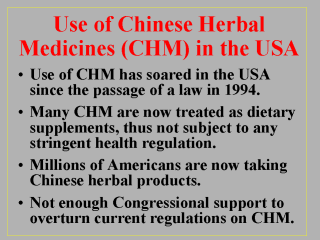| front |1 |2 |3 |4 |5 |6 |7 |8 |9 |10 |11 |12 |13 |14 |15 |16 |17 |18 |19 |20 |21 |22 |23 |review |
 |
In the USA, the
sales of herbal medications, including those of Chinese herbs, have soared dramatically
since 1994, the year the Dietary Supplement Health and Education Act (DSHEA) was passed.
Under this federal law, many herbal medications are treated as dietary supplements and, as
such, their use and sales are no longer subject to any stringent health regulation. For example, manufacturers need not obtain any approval from the Food and Drug Administration before marketing a dietary supplement. The agency may not take a herb off the market unless it has the evidence that a health problem is strongly associated with the use of the herb. And no regulations need to exist for the processing, harvesting, and packaging of herbs now sold in the USA. For several years, the U.S. Congress has introduced several bills to change how dietary supplements are regulated. To this date, none has gained enough support to amend or overturn any of the DSHEA’s provisions passed in 1994. Many herbal medications in the USA now are basically sold like Advil, Benadryl, Tylenol, or any other over-the-counter product. It is fair to claim that millions of Americans are now taking Chinese herbal products. This estimation is based on the observation (Eisenberg et al., 1993; Fetrow and Avila, 1999) that each year over 60 million people in the USA use herbal and other alternative remedies, of which the Chinese portion has a considerable share as this is well reflected in import data compiled for the U.S. government (e.g., Nardinelli et al., 1999) and export data released by China. |